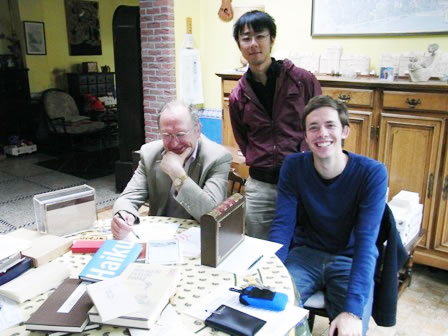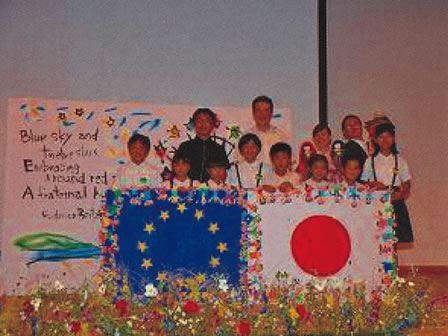Japan-EU English Haiku Contest:
Cooperation with Matsuyama City through Haiku
![]()
Haiku in English? What words do you use to express the seasons or the meter? These were what I thought, as many Japanese would do, when I first heard about English haiku. Nevertheless, many people abroad enjoy writing HAIKU as a hobby. Obviously, they write haiku not in Japanese but in their own language.
Mr. Herman Van Rompuy, the President of European Council is one of them. He even published a collection of his haiku as a haiku poet. That triggered Japan and the EU to host a Japan-EU English Haiku Contest on the occasion of the annual Japan-EU Summit Meeting. The first contest was held in 2010. Speaking of haiku, Matsuyama City in Ehime Prefecture is well known as the birthplace of Masaoka Shiki, a famous haiku poet in Japan. I then consulted with officials at the tourism promotion section of Matsuyama City. They agreed to support the contest as the city has been promoting the branding of Matsuyama City as “a capital of haiku”.
The theme of the second Japan-EU English Haiku Contest held in May 2011 was “kizuna” or the bonds of friendship as a token of gratitude to the EU for its assistance to Japan in the aftermath of the Great East Japan Earthquake. There were a total of 364 entries from Japan and 25 EU member states. These haiku expressed support for Japan or gratitude for assistance from the EU. One entry each from Japan and the EU sections won the grand prize. The grand prize winner from the EU entry was Ms. Federica Bertacchini from Italy who depicted the EU flag embracing the Japanese flag as a token of bilateral friendship and cooperation. The counterpart from Japan was Mr. Shunsuke Oyu, who put his sense of gratitude for assistance from around the world into his entry. As a supplementary prize, Ms. Bertacchini was invited to Dogo hot springs in Matsuyama City while Mr. Oyu was invited to Brussels, the home of President Van Rompuy. They were welcomed by the citizens there.
This is not the only example of collaboration between Matsuyama City and the Ministry of Foreign Affairs of Japan through haiku. Matsuyama City hosted a ceremony to set up a haiku post box at the Mission of Japan to the European Union in Brussels on September 19, 2011, in commemoration of the 110th anniversary of the demise of Masaoka Shiki. A total of 90 haiku post boxes are already distributed across Matsuyama in an effort to promote haiku, but the haiku post box in Brussels is the first to be introduced outside Japan. What drives us is the aspiration to appeal to people about the allure of haiku and the profundity of Japanese culture from Brussels.
Haiku is often among the topics of talks between Japanese and EU leaders. Haiku now bonds Japan and the EU at the citizen’s level as well as the political leaders, contributing to closer bilateral relations. If Masaoka Shiki were alive now, who had great interest in foreign cultures, and knew this, he would write haiku for Japan-EU relations.
Jiro Takamoto
Second Secretary
Mission of Japan to the European Union

Mr. Oyu, at center, with haiku lovers in Brussels
His prize-winning work:
Delightful moment/learning how to say thank you/in dozens of languages

Ms. Federica Bertacchini, at center in the back row, with citizens from Matsuyama
Her prize-winning work:
Blue sky and twelve stars/Embracing a round red sun/a fraternal hug

